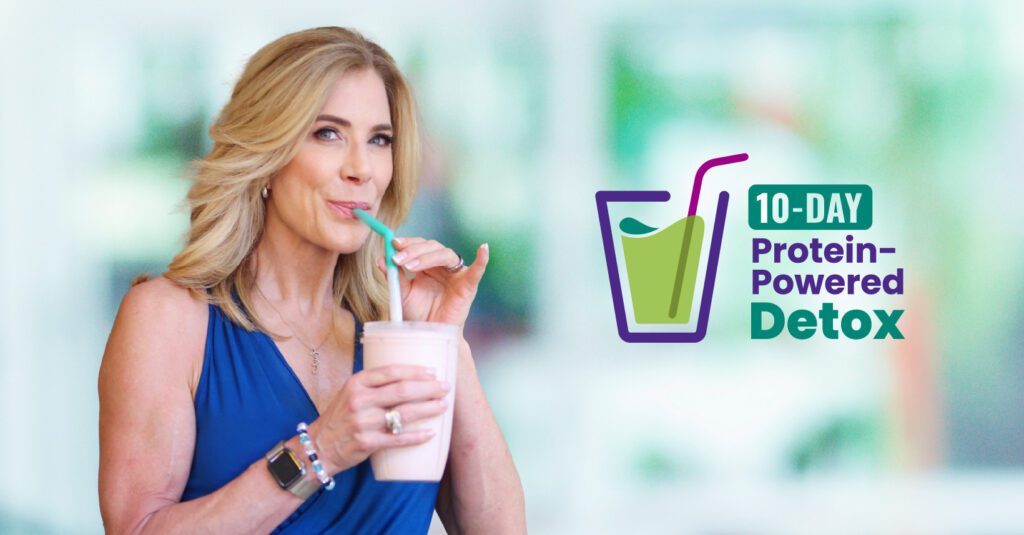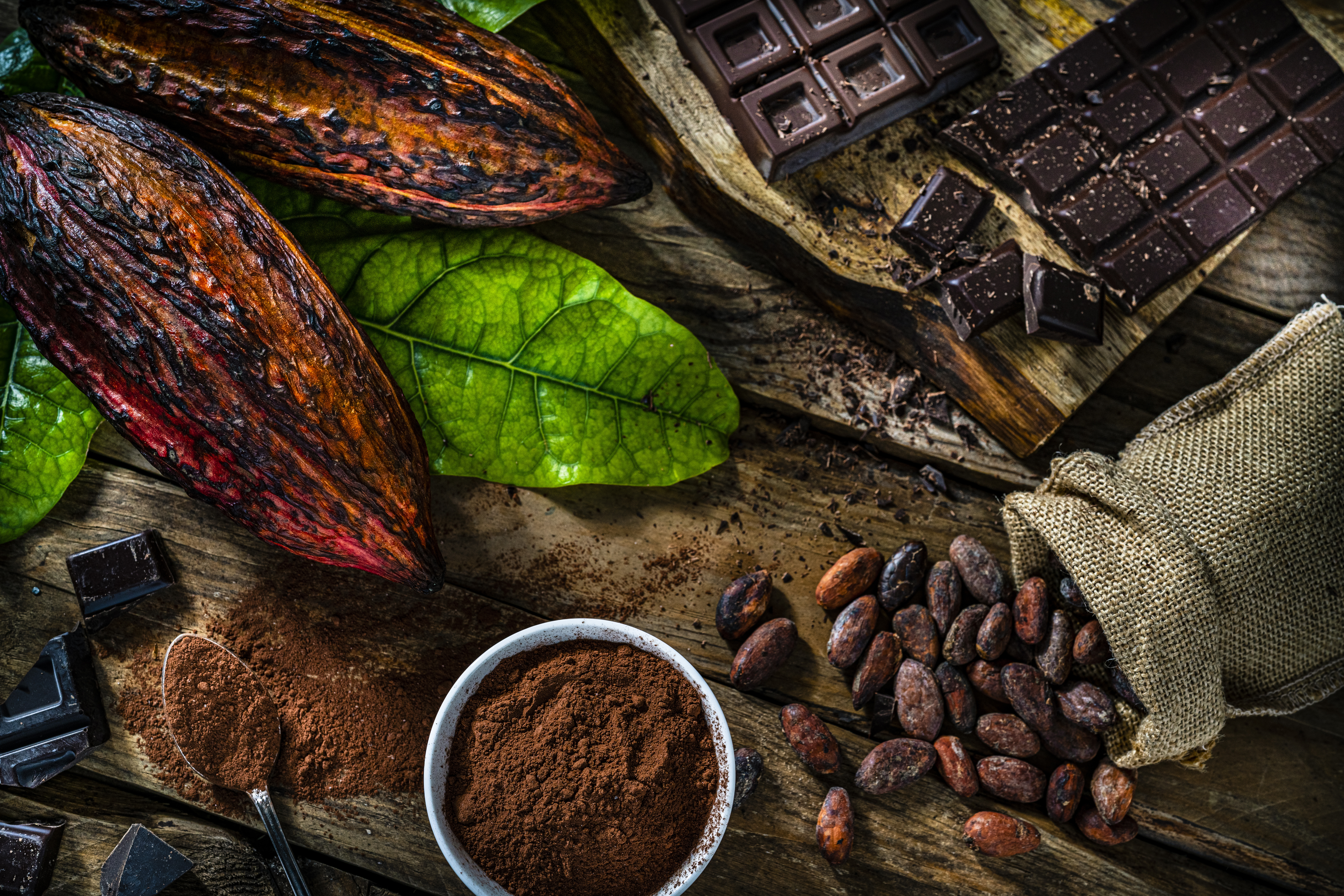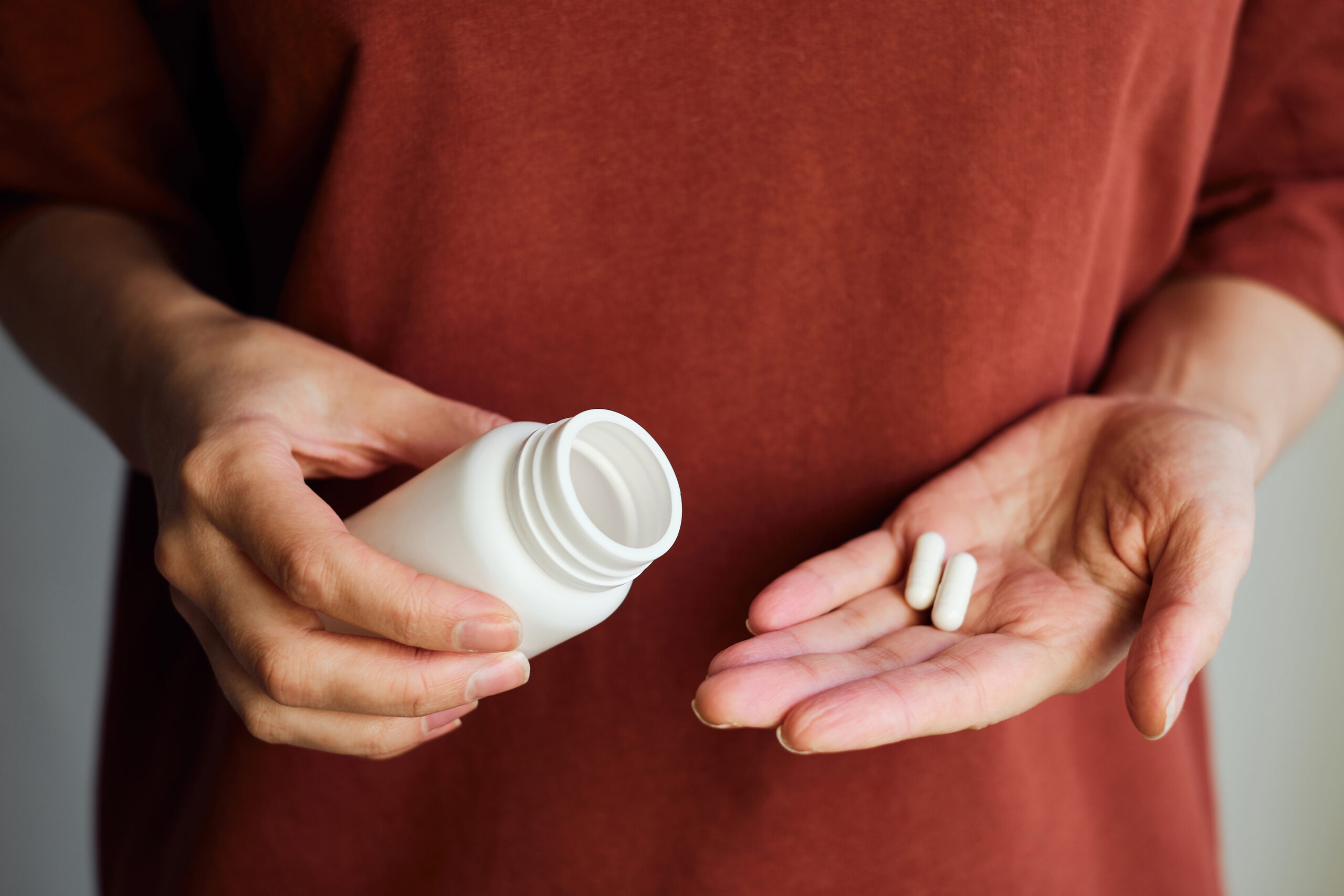How many times have you felt like you’re doing everything “right,” but the scale refuses to budge?
Losing weight is a journey that often comes with its fair share of difficulties, and one of the most frustrating hurdles is when you hit a plateau. When your progress stalls despite your best efforts, it’s easy to become discouraged.
12 Ways to Break a Weight-Loss Plateau
Allow me to be the voice of hope here. With the right approach, you can reach your goal weight. These 12 tried-and-true strategies can help you finally break through the slump and help you regain momentum.
1. Do a Macro Audit
When it comes to breaking a plateau, protein is your ally. Protein-rich foods promote fullness and satisfaction, reducing the temptation to overeat or snack. This is why I say to eat protein first—aside from ensuring you reach your daily quota, it makes overeating much less likely.
Protein also has a higher thermic effect than carbohydrates and fats. This means your body uses more calories to digest and metabolize protein, contributing to your overall calorie expenditure during the day and potentially aiding weight-loss efforts.1
Meeting your protein intake (I recommend a minimum of 100 grams per day) also helps preserve muscle, ensuring that your body primarily burns fat for energy rather than breaking down muscle during weight loss.
Doing a macro audit means tracking your food intake for a few days to see how much protein (along with the other macronutrients, fat and carbohydrates) to see if you’re getting in optimal amounts. You also want to make sure you’re getting at least 30 grams of fiber each day.
Research shows that fiber can keep you full longer so you lose more weight. Most of us get less: participants in one study averaged 19 grams of fiber a day.2
Healthy fats help your goals, too. Animal studies show monounsaturated fats in avocado and olive oil can help with weight loss.3 Likewise, omega-3 fatty acids in wild-caught seafood can support fat loss. It doesn’t take much to get those benefits: about two portions of fatty fish weekly, though most of us aren’t even getting that amount.4
This nutrient combo keeps your blood-sugar levels and hormones regulated so you stay full, focused, and burning fat for hours.
2. Ensure That You’re Breaking Down Food Well
Choosing the right foods isn’t enough to support your fat-loss efforts. Equally important is how well your body breaks down their nutrients during digestion. Deficiencies in some nutrients can interfere with how well your body functions, which means you may not be burning fat optimally.5
Conditions like stress and age mean your body may produce fewer digestive enzymes. This can reduce the capacity to fully break down and absorb protein and other nutrients, potentially depriving your body of amino acids and other nutrients that support your fat-loss efforts.
A digestive enzyme supplement can support breakdown and absorption, ensuring you get the most nutrients from your diet.
Protein First Enzymes combines digestive enzymes and select botanicals to help promote efficient digestion of fats, carbohydrates, and proteins (even problem proteins like gluten).*
3. Address Food Intolerance
You might not think you have a food intolerance, but food intolerance can be sneaky. Seemingly healthy foods might actually be harming your body, and because they’re in the health-food aisle, you might not make the connection. But when you repeatedly eat foods you’re sensitive to, even mildly, they can keep your immune system fired up and create inflammation.
If you can’t tolerate foods like yogurt, eggs, soy milk, and whole-wheat bread, your body can become overwhelmed, especially when you consume them regularly. Your immune system never calms down, creating problems like inflammation.
The biggest food-intolerance offenders are:
- Gluten (whole-wheat bread, multi-grain muffins, etc)
- Soy (tofu, tempeh, faux meats)
- Dairy (yogurt, cheese, milk)
- Peanuts
- Eggs
- Corn
- Sugar and artificial sweeteners
Eliminating these foods can be the needle mover to break a plateau. In one study, researchers determined whether people who struggle to lose weight might benefit from a special diet that eliminates foods they are intolerant to—and it worked. Compared to those who didn’t eliminate problem foods, the food-intolerance group lost significant weight and fat.6
People who are sensitive to gluten, for instance, can have adverse reactions like headaches, brain fog, and weight gain. One study revealed a gluten-free diet may effectively reduce inflammation and improve insulin sensitivity, ultimately supporting weight loss efforts.7
In The Virgin Diet, I help you pinpoint your food intolerances through a careful elimination plan. Removing these foods can help you break weight-loss plateaus and find your goal weight. I’ll show you how to shed pounds, lose belly bloat, gain energy, clear up inflammation, and look and feel years younger. You’ll never feel hungry or deprived!
4. Do the Right Kind of Exercise
When it comes to weight loss, where you lose that weight matters. Your goal is to burn fat and build muscle (also known as recomposition or recomping). A body-composition scale will help you measure these metrics, and resistance training will help you move them in the right direction.
When most women think of exercise to lose weight, they think about spending hours on the treadmill or in lengthy fitness classes. However, excessive cardio can lead to muscle loss because cardio workouts predominantly burn calories from fat and muscle tissue. Your body can quickly adapt to cardio workouts, leading to a plateau in fat loss. It becomes challenging to keep increasing the intensity and duration to see the same results.
Resistance training has the opposite effect: it stimulates muscle growth. More muscle increases your metabolism, helping you burn more calories even at rest. Building muscle can enhance definition by increasing strength and flexibility, creating a leaner, more toned body.
One review found favorable effects of resistance on weight loss among overweight or obese adults. Researchers noted reduced amounts of dangerous visceral fat and body-composition changes when participants lifted weights regularly.8
My FREE Resistance Training Cheat Sheet provides everything you need to burn fat and boost your fitness journey, including home gym essentials, an 8-week workout plan, and a progress tracker to track your sets, reps, and weights with each workout.
5. Move More Throughout the Day
Exercise is important, but so is any movement. While I want you to do resistance training regularly, I also want you to move more, period.
Non-exercise activity thermogenesis (NEAT) refers to all the physical activities you do that aren’t structured exercise, but still burn calories.9 Walking more, standing instead of sitting, taking the stairs instead of the elevator, and doing household chores all increase your NEAT.
One study examined how many calories people burned during selected activities and at rest. Compared with those who were motionless, people who did fidgeting-like movements (like pacing back and forth or playing with something in their hand) burned more calories.10 These small daily movements can add up to support fat loss.
6. Optimize Sleep
Not getting enough quality sleep can contribute to weight-loss plateaus. Poor sleep can increase your hunger hormone ghrelin and lower your satiety hormone leptin. This leaves you hungrier and less able to resist those blueberry muffins on your favorite coffee shop counter.11 Other research shows that poor sleep can increase your urge to snack on sugary foods, even when you aren’t hungry.12
The solution is to aim for eight hours of uninterrupted sleep every night. Establish a consistent sleep schedule, create a relaxing bedtime routine, and ensure a comfortable sleep environment. A quality sleep supplement that contains melatonin and other sleep-support nutrients can give you that added boost for deep, replenishing sleep every night.*
7. Manage Stress
Stress and weight gain go hand in hand. Elevated levels of your stress hormone cortisol can increase your appetite and cravings for high-sugar-impact foods. Cortisol promotes fat storage, particularly around your midsection, as part of your body’s response to stress.13
Finding ways to reduce stress can help break a plateau. Some of my favorite stress-reduction techniques include mindfulness, meditation, yoga, and deep-breathing exercises. A positive mindset can also help manage stress.
In Mindset Mastery: 20 Practices for Power and Purpose, you’ll learn how to incorporate mindset-shifting moments into your daily life.
8. Try Intermittent Fasting
Intermittent fasting involves cycling between periods of eating and fasting. Some studies show that restricting your food intake to a certain time can help you lose weight. Most plans involve a fasting window of 16-20 hours, although you don’t need to go that long.
Enjoy dinner, close the kitchen for the evening, and push breakfast till 9 or 10 am. You’ll create a near-effortless 12-15-hour fasting window. One review of 27 intermittent fasting plans found that people lost up to 13% of their initial weight without serious adverse events.14
You don’t need to do crazy-long fasts to get those benefits, either. Close the kitchen after dinner (three or four hours before bedtime) and push breakfast forward the following day to 9 or 10 am with a loaded smoothie. You’ve nearly effortlessly created a 12-15 hour fasting window—and you’ll be sleeping for most of that time!
9. Track to Monitor and Improve
What you measure and monitor, you can improve. Weighing yourself daily can give you more significant benefits than weighing in once a week. Tracking works: one study among 47 obese men and women who used the same diet and eating plan over six months revealed those who tracked their weight daily lost an average of 13 pounds more than those who didn’t weight daily.15
Modern technology offers numerous tracking devices and apps to help you troubleshoot and more easily reach your goals. Cronometer is great for monitoring your daily food intake, including your protein. Studies show that those who consistently track their macros have better weight-loss success compared with infrequent trackers.16 Likewise, a body-composition scale can determine whether your weight loss is coming from fat or muscle.
10. Drink More Water (and Green Tea)
Drinking plenty of water can help curb your appetite and make you feel fuller. One study found that participants who had a glass of water before a meal ate less at that meal.17
Green tea can help, too. It’s known to boost metabolism, curb your appetite, and promote fat breakdown to overcome weight-loss plateaus. 18 These benefits come from a group of antioxidants called catechins, with the most abundant being EGCG. The combination of caffeine and catechins in green tea may promote thermogenesis, which increases your metabolism and helps you burn more calories. Green tea can also help curb appetite by impacting your appetite-regulating hormones.19
Those are among the reasons I drink 32 oz of green tea daily!
11. Get Support
Studies show that people who participate in online health groups have better success with weight loss.20 Group support provides accountability and motivation, helping you stick with your weight-loss goals. Sharing experiences and obstacles can offer emotional support and reduce feelings of isolation.
Learning about others’ success can also be a powerful type of motivation! My Facebook Lifestyle Group offers a safe space for finding support with others working to lose weight and get healthier.
12. Address Your Toxic Burden
Toxins can make it harder for you to lose weight. This is because they can disrupt various physiological functions crucial for metabolic efficiency. These toxins are everywhere: in your water, food, the air you breathe, and everyday products like cosmetics and personal care products. The cumulative impact of exposure to various chemicals and pollutants can interfere with your body’s metabolism and fat storage.
Scientists call some toxins obesogens because they impact hormones and enzymes that regulate metabolism and fat storage, leading to obesity.21 Some obesogens can disrupt how your body processes sugars and fats and result in weight gain. Others can interfere with hormones that control appetite and hunger, making you more likely to overeat.
Addressing toxic burden can be a significant factor in promoting fat loss. Reducing exposure to obesogens and other toxins can help your body function more efficiently and break weight-loss resistance.

A Science-Supported Detox That Helps You Burn Fat
Holding on to toxins is one way your body resists fat loss. Detoxifying provides the dual benefits of lightening your toxic burden and making it easier to lose fat safely and sustainably.
If you’ve detoxed in the past, you’re probably aware of the hunger, cravings, low energy, brain fog, and other obstacles that can make your day miserable. What if I told you those plans weren’t effective—and could even be making your toxic burden worse?
I designed the 10-Day Protein-Powered Detox Program to address the biggest glitch in most plans: optimal protein. Providing these essential amino acids gives your body the nutrients to detoxify and sustain a healthy weight. This program gives you everything you need (including a private, supportive Facebook group) to ease your toxic burden while you’re burning fat.*
Learn more about the 10-Day Protein-Powered Detox here.
References:
- Harvard Health: getting more fiber — can help with weight loss
- Yang SC, Lin SH, Chang JS, Chien YW. High Fat Diet with a High Monounsaturated Fatty Acid and Polyunsaturated/Saturated Fatty Acid Ratio Suppresses Body Fat Accumulation and Weight Gain in Obese Hamsters. Nutrients. 2017 Oct 19;9(10):1148. doi: 10.3390/nu9101148. PMID: 29048361; PMCID: PMC5691764.
- Healthline: Can Omega-3 Fish Oil Help You Lose Weight?
- Bowden, Jonny; Sears, Barry; Cole, Will. Living Low Carb: Revised & Updated Edition (p. 475). Union Square & Co.. Kindle Edition.
- .Onmus, Meltem, Avcu, Elif, Saklamaz, Ali.The Effect of Elimination Diet on Weight and Metabolic Parameters of Overweight or Obese Patients Who Have Food Intolerance. Journal of Food and Nutrition Research. 2016) 4. 1-5. 10.12691/jfnr-4-1-1. .
- Soares FL, de Oliveira Matoso R, Teixeira LG, Menezes Z, Pereira SS, Alves AC, Batista NV, de Faria AM, Cara DC, Ferreira AV, Alvarez-Leite JI. Gluten-free diet reduces adiposity, inflammation and insulin resistance associated with the induction of PPAR-alpha and PPAR-gamma expression. J Nutr Biochem. 2013 Jun;24(6):1105-11. doi: 10.1016/j.jnutbio.2012.08.009. Epub 2012 Dec 17. PMID: 23253599.
- Bellicha A, van Baak MA, Battista F, Beaulieu K, Blundell JE, Busetto L, Carraça EV, Dicker D, Encantado J, Ermolao A, Farpour-Lambert N, Pramono A, Woodward E, Oppert JM. Effect of exercise training on weight loss, body composition changes, and weight maintenance in adults with overweight or obesity: An overview of 12 systematic reviews and 149 studies. Obes Rev. 2021 Jul;22 Suppl 4(Suppl 4):e13256. doi: 10.1111/obr.13256. Epub 2021 May 6. PMID: 33955140; PMCID: PMC8365736.
- Levine JA, Schleusner SJ, Jensen MD. Energy expenditure of nonexercise activity. Am J Clin Nutr. 2000 Dec;72(6):1451-4. doi: 10.1093/ajcn/72.6.1451. PMID: 11101470.
- Levine JA, Schleusner SJ, Jensen MD. Energy expenditure of nonexercise activity. Am J Clin Nutr. 2000 Dec;72(6):1451-4. doi: 10.1093/ajcn/72.6.1451. PMID: 11101470.
- Yale New Haven Health: Does Lack of Sleep Cause Weight Gain?
- Papatriantafyllou E, Efthymiou D, Zoumbaneas E, Popescu CA, Vassilopoulou E. Sleep Deprivation: Effects on Weight Loss and Weight Loss Maintenance. Nutrients. 2022 Apr 8;14(8):1549. doi: 10.3390/nu14081549. PMID: 35458110; PMCID: PMC9031614.
- Cleveland Clinic Health Essentials: Can Stress Make You Gain Weight?
- Welton S, Minty R, O’Driscoll T, Willms H, Poirier D, Madden S, Kelly L. Intermittent fasting and weight loss: Systematic review. Can Fam Physician. 2020 Feb;66(2):117-125. PMID: 32060194; PMCID: PMC7021351.
- Ingels JS, Misra R, Stewart J, Lucke-Wold B, Shawley-Brzoska S. The Effect of Adherence to Dietary Tracking on Weight Loss: Using HLM to Model Weight Loss over Time. J Diabetes Res. 2017;2017:6951495. doi: 10.1155/2017/6951495. Epub 2017 Aug 9. PMID: 28852651; PMCID: PMC5568610.
- Jeong JN. Effect of Pre-meal Water Consumption on Energy Intake and Satiety in Non-obese Young Adults. Clin Nutr Res. 2018 Oct;7(4):291-296. doi: 10.7762/cnr.2018.7.4.291. Epub 2018 Oct 31. PMID: 30406058; PMCID: PMC6209729.
- Healthline: How Green Tea Can Help You Lose Weight
- Chacko SM, Thambi PT, Kuttan R, Nishigaki I. Beneficial effects of green tea: a literature review. Chin Med. 2010 Apr 6;5:13. doi: 10.1186/1749-8546-5-13. PMID: 20370896; PMCID: PMC2855614.
- Zhou Y, J H Zhu J. How online health groups help you lose weight: The role of group composition and social contact. Digit Health. 2022 Jul 14;8:20552076221112838. doi: 10.1177/20552076221112838. PMID: 35860616; PMCID: PMC9290157.
- Gupta R, Kumar P, Fahmi N, Garg B, Dutta S, Sachar S, Matharu AS, Vimaleswaran KS. Endocrine disruption and obesity: A current review on environmental obesogens. Current Research in Green and Sustainable Chemistry. 2020 Jun;3:100009. doi: 10.1016/j.crgsc.2020.06.002. Epub 2020 Jun 30. PMCID: PMC7326440.
The views in this blog by JJ Virgin should never be used as a substitute for professional medical advice. Please work with a healthcare practitioner concerning any medical problem or concern. The information here is not intended to diagnose, treat, or prevent any disease or condition. Statements contained here have not been evaluated by the Food and Drug Administration.
*These statements have not been evaluated by the Food and Drug Administration. This product is not intended to diagnose, treat, cure, or prevent any disease.







